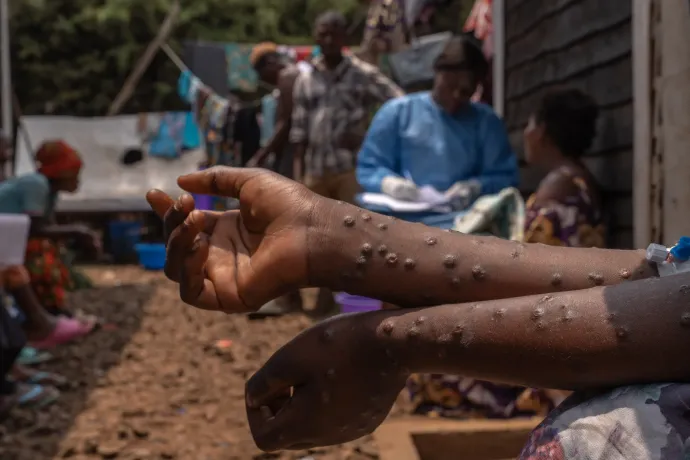September 19, 2024 – 7:58 PM

The arm of a monkeypox patient at Kavumu Hospital in Congo on August 24 – Photo: Murhabazi / AFP
The spread of monkeypox in Africa has not yet been stopped, MTI reported, citing a statement from the Africa Centres for Disease Control and Prevention (Africa CDC).
According to the information, nearly 3,000 new suspected cases have been reported on the continent in one week, of which 374 have been confirmed so far. The discrepancy between presumed and verified cases is due to a lack of testing and laboratory capacity. Virologist Gabor Kemenysi previously told Telex that the most effective way to combat the virus would be if testing and treatment were focused on its place of origin, the Congo and its surrounding areas.
The director of the Africa CDC, Jean Kasia, said at his weekly press conference that they know of 14 other deaths. In addition to all this, since the beginning of the year, more than 29,000 people have been infected with monkeypox and 738 people have died in 15 countries on the continent.
“We can say that we have not yet been able to control monkeypox.”
Cassia stressed, referring to the increasing number of cases. Compared to the same period last year, this year there is an increase in infections of almost 180 percent and an increase in deaths of 39 percent.
To prevent the spread of the virus, vaccine offers and a vaccination campaign that has now begun give hope in Rwanda. According to the Africa CDC, nearly 500 people have been vaccinated so far. At the same time, Rwanda is not the country most affected, the epidemiological situation is much more serious in the neighboring Democratic Republic of Congo and Burundi. According to Kasia, the Congolese vaccination plan is not yet complete. Because of the vaccine, the debate about the equitable distribution of vaccines has re-ignited.
On August 14, the World Health Organization (WHO) declared an international health emergency due to the spread of the Klád Ib virus variant, because according to experts, this variant can cause a more contagious and severe disease than previously known.






